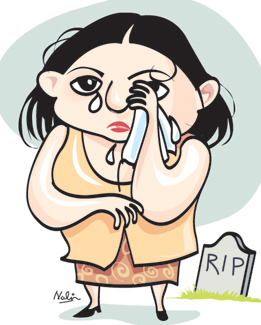Stress: The big four
Many think that there are thousands or more causes of stress, but all the possible causes of stress that might trouble human beings can be classified into just four groups.
Having discussed the definitions of stress last month, it would be useful, therefore, to look at these four groups. Over the years although I have challenged my students to tell me a cause of stress that does not fit in to any of these categories, they have not been able to come up with one.
Here are the four categories:
Loss — Not surprisingly when we lose a person we love and value, there is grief and mourning. Loss is not confined to people, but includes material things as well, the most obvious being money. Other losses that could have a major impact on a person are the loss of a job, loss of status and dignity or if there were charges of impropriety, or against one’s honour and reputation. Sometimes these losses are more devastating than loss of material things.

There may also be other more subtle forms of loss such as the loss of hope and aspirations. What a person hoped for and expected to happen may be taken away from him. If these losses are sudden and unexpected, the effect is even more overwhelming.
This can lead to a state of hopelessness which for us Psychiatrists is a strong indicator of a high risk for suicide.
Role change — All of us have different roles in life. At different times, sometimes at the same time, we are required to play the role of father, mother, husband, wife, teacher, mentor, employer etc. These roles cast certain responsibilities on us, and require from us, expenditure of thought and effort.
For example, when a person gets married, he or she becomes a husband or wife and is required to take on new responsibilities. Even though marriage is usually a happy event, it is a time and source of great stress, especially with the drama and expense that goes into a ‘traditional’ Sri Lankan wedding. So role changes make demands on and challenge the human psyche and lead to stress.
Conflict or dilemmas – This does not mean physical battles or wars, but conflicts of the mind. A dilemma is a situation where a person is required to choose between two alternatives, both of which are either equally good or bad.
For example, a person may be required to choose between two job offers or between two partners. If one choice is clearly better than the other, there is no dilemma and hence no stress but if the choice is not clear and one is not clearly better than the other, then it is a dilemma, a mental conflict, leading to stress. The degree of stress, of course, is relative to how crucial the choice is for that person’s life.
Human relationships – This is perhaps the commonest cause of stress and most of us would know this. We humans are social animals and need to live in communities. We need the help of other human beings to live our lives happily and fruitfully. While being a source of strength and joy, relationships are also sources of great distress and unhappiness.
Wars have been fought and great leaders have fallen due to problems with other human beings. Paris, the Prince of Troy from ancient times, and Bill Clinton from more modern times, are such examples. One of the commonest reasons given by people who engage in self-harm are relationship issues either with their parents or partners and often, when we inquire into why people have committed suicide, a problem in human relationships is the root cause. So as we go through life we need other human beings but they can also be sources of great pain.
So in a nutshell, all the possible sources of stress in the world fall into these four categories. Let me know if you can think of any other category.
(Next: How can we cope with stress?)
MediScene continues a new series on mental illness by Consultant Psychiatrist Dr. Raveen Hanwella. Dr. Hanwella who is attached to the National Hospital is also a Senior Lecturer in Psychiatry and Head, Department of Psychological Medicine, Faculty of Medicine, University of Colombo.
Something bothering you? Please write in to Dr. Hanwella C/o MediScene, The Sunday Times, No. 8, Hunupitiya Cross Road, Colombo 2 or e-mail: raveensundaytimes@gmail.com
Follow @timesonlinelk
comments powered by Disqus




















